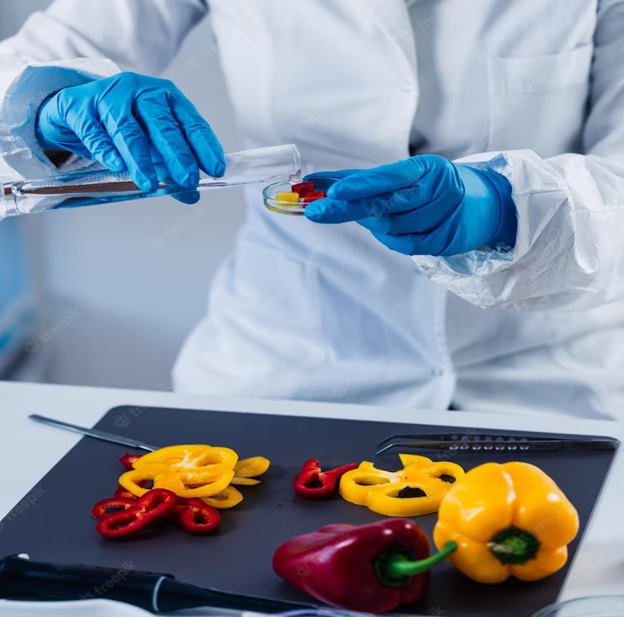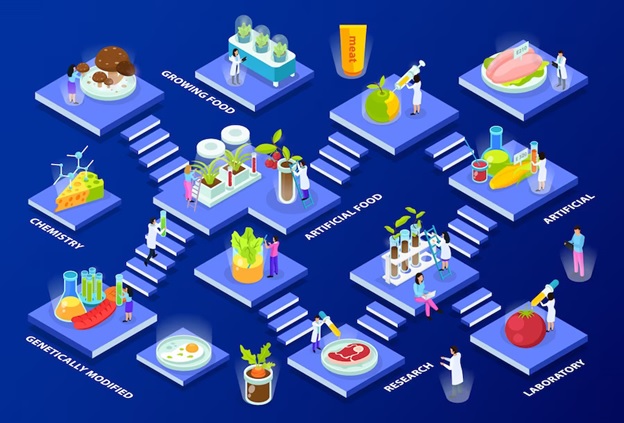Introduction to Food Science
Food science, a multidisciplinary field blending chemistry, biology, and engineering, has emerged as a catalyst for transforming the way we eat. By exploring the properties of food and applying innovative techniques, food scientists strive to enhance the quality, taste, and nutritional value of our meals. As we delve into the realm of food science, its impact on our dietary choices and the wider food industry becomes increasingly evident.

Understanding the Impact of Food Science on our Eating Habits
In this era of rapid advancements, food science has left an indelible mark on our eating habits. By unraveling the complexities of food, scientists have pioneered breakthroughs in taste enhancement, texture modification, and preservation techniques. These developments have not only broadened our culinary horizons but also influenced the foods we crave. The ever-growing repertoire of flavors and textures is a testament to the transformative impact of food science on our palates.
I'm so excited to prepare so many #recipes of #drinks, #cocktails, #Moonshine, #food - I'm ready to get down to work! #Moonshinerecipe
Enhancing Taste and Texture through Food Science Innovations

Central to the realm of food science is the quest to enhance taste and texture. By delving into the intricacies of chemical reactions during cooking and processing, scientists have harnessed their knowledge to revolutionize our sensory experiences. The advent of flavor enhancers and natural additives has unlocked possibilities for producing low-sodium and low-fat alternatives that don’t compromise on taste. Simultaneously, advances in texture modification have paved the way for improved mouthfeel and consistency across various food products, delighting consumers with every bite.
Nutritional Advancements: Improving Health and Well-being
Food science has become an invaluable ally in our pursuit of optimal health and well-being. Meticulous research and analysis have unraveled the nutritional compositions of different foods, empowering us to make informed dietary choices. Furthermore, food scientists have devised ingenious methods to fortify foods with essential vitamins, minerals, and nutrients, addressing prevalent nutritional deficiencies. These advancements have played a pivotal role in fostering overall wellness and empowering individuals to take charge of their own health through mindful eating practices.
As we continue to embrace the marvels of food science, we witness how it revolutionizes our culinary landscape, making healthy and delicious options more accessible. The amalgamation of scientific expertise and culinary creativity leads to the development of innovative food products that cater to diverse dietary needs and preferences. Food science also acts as a guiding force in reducing food waste and promoting sustainable practices within the industry.
Sustainable Food Solutions: Reducing Environmental Impact

In an era marked by growing concerns about environmental sustainability, food science plays a pivotal role in developing sustainable food solutions that align with the values of consumers. By harnessing innovative techniques and technologies, food scientists are actively working to reduce the environmental impact of food production and consumption. From farm to table, efforts are being made to minimize waste, conserve resources, and promote eco-friendly practices.
One area where sustainable food solutions have gained traction is in the reduction of food waste. Through improved storage techniques, packaging innovations, and optimized supply chains, food scientists aim to minimize the amount of food that goes to waste. By doing so, they not only address the ethical concern of food scarcity but also mitigate the environmental consequences associated with food production, such as deforestation and greenhouse gas emissions. This commitment to sustainability is driven by the desire to meet consumer expectations, including those who participate in initiatives like the “Tell The Bell” customer satisfaction survey, where feedback on sustainable practices can shape future strategies.
Moreover, food scientists are exploring alternative protein sources as a means to reduce the environmental footprint of traditional livestock production. By developing plant-based meat substitutes and promoting insect-based protein, they offer sustainable options that require fewer resources and emit fewer greenhouse gases. These advancements align with the goal of providing nutritious and environmentally friendly alternatives without compromising on taste or texture, thereby addressing the evolving preferences of consumers who are increasingly conscious of their food choices and participate in initiatives like the “Customer Satisfaction Survey” to voice their concerns and shape the industry’s direction.
Convenience and Accessibility: Food Science for Modern Lifestyles
In our fast-paced modern lifestyles, convenience plays a pivotal role in our food choices. Food science has risen to the occasion by developing technologies that cater to the demand for quick and easy meals. From ready-to-eat microwaveable dishes to pre-packaged, portion-controlled snacks, convenience foods have become an integral part of our diets.
Through meticulous research and development, food scientists have devised techniques to ensure that convenience foods not only meet our time constraints but also provide adequate nutrition. They strive to strike a balance between convenience and health, creating products fortified with essential vitamins and minerals. This allows individuals with busy schedules to maintain a well-rounded diet without compromising their nutritional needs. Consumer feedback obtained through initiatives like the “Tell The Bell” customer satisfaction survey helps food scientists understand the evolving preferences and expectations of consumers, ensuring that convenience foods meet their demands for both convenience and nutritional value.
Future Directions: Exploring Cutting-edge Food Science Technologies

As we look ahead, the future of food science holds tremendous potential. Researchers are actively exploring cutting-edge technologies to further revolutionize the way we eat. One such area of focus is 3D-printed food, which offers the possibility of customizable and personalized meals. By using precise layering techniques, food scientists can create intricate food structures, optimizing taste, texture, and nutritional content. Feedback from initiatives like the “Customer Satisfaction Survey” can provide valuable insights into consumer preferences regarding personalized and innovative food options.
Additionally, artificial intelligence (AI) and machine learning are being integrated into food science research. These technologies enable in-depth analysis of food composition, leading to personalized dietary recommendations tailored to individual needs. AI algorithms can analyze vast amounts of data, including personal health profiles and genetic information, to provide insights into optimal food choices and nutrient intake. Incorporating consumer feedback obtained through initiatives like the “Tell The Bell” customer satisfaction survey helps shape the development and implementation of AI-driven solutions that meet the specific needs and expectations of consumers.
Conclusion
In the realm of food science, innovation and research have transformed our eating habits, revolutionizing the way we approach food. From enhancing taste and texture to improving nutrition and addressing sustainability, food science has paved the way for a healthier, more accessible, and environmentally conscious culinary landscape. The amalgamation of scientific expertise and culinary creativity has resulted in the development of innovative food products that cater to diverse dietary needs and preferences. As we look to the future, cutting-edge technologies such as 3D-printed food and artificial intelligence hold promise for personalized and sustainable food solutions. By incorporating consumer feedback obtained through initiatives like the “Tell The Bell” customer satisfaction survey, food scientists can continue to meet the evolving expectations and preferences of consumers, ensuring a bright and flavorful future for the world of food.

Moonshine Recipes
Moonshine recipes, cocktail recipes, infusions, distilling, beer and wine brewing, cooking, menu, food, cocktail and more
Empire Of Heaven Vodka Cocktail | 2023
moonshinerecipe.org
This is one of the easiest cocktail recipes to make.Pimm's Cup Recipe With Fruits & Ginger Ale Mix | 2023
moonshinerecipe.org
This cocktail is a wonderful time pass idea as well as great for regular sipping routine!Gin And Tonic Recipe | Tanqueray Gin Mix | 2023
moonshinerecipe.org
Learn this fabulous Gin and Tonic Cocktail?that is as easy as apple pie! This cocktail is a wonderful time pass idea as well as great for regular sippingGin Basil Smash Cocktail Drink Recipe
moonshinerecipe.org
Learn this fabulous Best Basil Smash Cocktail?that is as easy as apple pie! This cocktail is a wonderful time pass idea as well as great for regular sippingBest Selling Products For Daily Needed Shopping |
moonshinerecipe.org
We are excited to showcase some quality lists of products your body needs. Reviewed by users, written by experienced people about these products hand picked MoonshineRecipe.Org
MoonshineRecipe.Org
